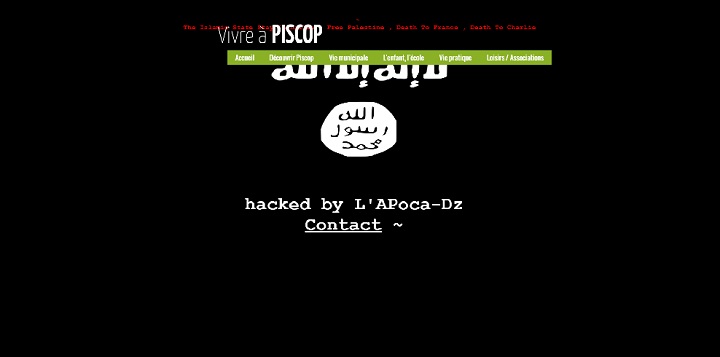As the manhunt continued for two brothers suspected of carrying out the massacre at the office of French satire magazine Charlie Hebdo, several municipalities near Paris had their websites taken over with the image of an ISIS flag.

Wednesday’s attack in Paris has not been linked to ISIS — several reports have suggested it’s more likely to be connected to the Yemen-based al-Qaeda in the Arabian Peninsula — but the cyber-attack appears to be in response to the Charlie Hebdo shootings.
READ MORE: Defiant French mourn 12 dead in Paris attack
The cyber-attack displayed the image of the ISIS flag, accompanied by Arabic-language music and the message: “The Islamic State Stay Inchallah, Free Palestine, Death to France, Death to Charlie.”
In the aftermath of the shootings, which left 12 people dead and 11 others injured, people around the world have shown their solidarity with the victims by spreading the message “Je Suis Charlie (I am Charlie).”
Among the towns affected by the cyber-attack were Piscop, Val D’Oise, Ezanville, Jouy-le-Moutier and Goussainville — all on the outskirts of Paris. At least two of the sites were taken offline completely after they were hacked.
According to the posting, the sites were hacked by “L’Apocca-Dz.” A link on the pages connected to a Facebook page.
READ MORE: Will the Charlie Hebdo attack fuel Europe’s far-right?

Get daily National news
Charlie Hebdo is a well-known satire magazine, in France, that has published several cartoons depicting the Prophet Muhammad.
According to witness accounts, the gunmen cried out they had “avenged the Prophet Muhammed” by killing 12 people and wounding 11 others.
Among the dead was editor Stephane Charbonnier, who was previously listed as “wanted dead or alive” by al-Qaeda in a 2013 edition of the terror network’s English-language propaganda publication, Inspire.
- Israeli strike on school leaves 22 dead, 30 wounded: Gaza Health Ministry
- FBI agents board vessel managed by company whose other cargo ship collapsed Baltimore bridge
- Secret Service’s next challenge: Keeping scores of world leaders safe at the UN General Assembly
- Top Hezbollah leader was among the 37 people killed in Israeli strike in Beirut








Comments